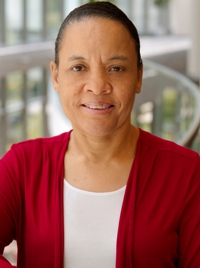CDC Helps “Shoot for the Moon”
Posted on by By Lisa C. Richardson, MD, MPH
By Lisa C. Richardson, MD, MPH
Director of CDC’s Division of Cancer Prevention and Control
As a medical oncologist, I have seen the devastating toll cancer can take on its victims. Unfortunately, I also know first-hand about the heartache of watching someone you love suffer…not as a doctor, but as a niece who lost her aunt to colon cancer.
However, I am inspired today by the new national effort that aims to double the pace of progress in the fight against cancer. The Cancer Moonshot is being led by Vice President Biden, who lost his son, Beau, to brain cancer in May of 2015. Using his son’s life and death as inspiration, Biden has created a Cancer Moonshot Task Force, of which I am honored to be a member. This summer, I represented the task force in Atlanta at one of the many Cancer Moonshot Summits held around the country. These summits were groundbreaking events that brought together people and organizations across the cancer community and beyond to reinvigorate cancer control efforts in the United States.
We have been charged with making the most of our federal investments, research and data, computing capabilities, targeted incentives, and private-sector efforts, and with elevating the patient’s voice as a partner in health care. We will combine our efforts and resources to find better and faster ways to prevent, diagnose, treat, and ultimately cure a disease that touches almost every family.
As part of Cancer Moonshot, the Cancer Support Community recently announced a new program, “Frankly Speaking about Clinical Trials.” This program will address an important gap in clinical trials participation by clearly explaining to people what clinical trials are and are not. Although I am hopeful about new and innovative therapies and precision medicine, I also know that we can’t take our foot off the pedal for prevention.
My heart was warmed when I heard Vice President Biden say, “Prevention can save more lives than anything else we can do.” So true. Most of the progress we have seen in cancer control is due to prevention. For example, the number of Americans who report being current cigarette smokers is at its lowest level ever, around 17% of the U.S. population. We cannot let up. Let’s keep doing what we do best and encourage each other to do everything we can to lower the risk of developing cancer, including—
- Maintaining a healthy weight.
- Quitting smoking.
- Eating well.
- Exercising regularly.
- Protecting your skin from the sun and staying out of tanning beds.
- Drinking no more than one (for women) or two (for men) alcoholic drinks a day.
- Asking your doctor about cancer screenings.
- Get your kids vaccinated against human papillomavirus (HPV).
Over the next five years, CDC will play a part by working through partnerships, comprehensive cancer control programs, and education efforts, but ultimately, the patient is central to the Cancer Moonshot—from risk factor reductions through diagnosis, treatment, and survivorship.
CDC and all Cancer Moonshot partners are here to make sure fewer people get cancer, but if cancer develops, we must respect the individuals and meet their needs while giving hope.
As Vice President Biden said recently, the Cancer Moonshot is “for the loved ones we’ve all lost, for the families that we can still save; let’s make America the country that cures cancer once and for all.” Many have asked, “Why now?” I would ask another question: “Why not?”
For more information, visit How to Prevent Cancer or Find It Early, Preventing Infections in Cancer Patients, and 3 Steps Toward Preventing Infections During Cancer Treatment from the CDC Foundation.
Posted on by

